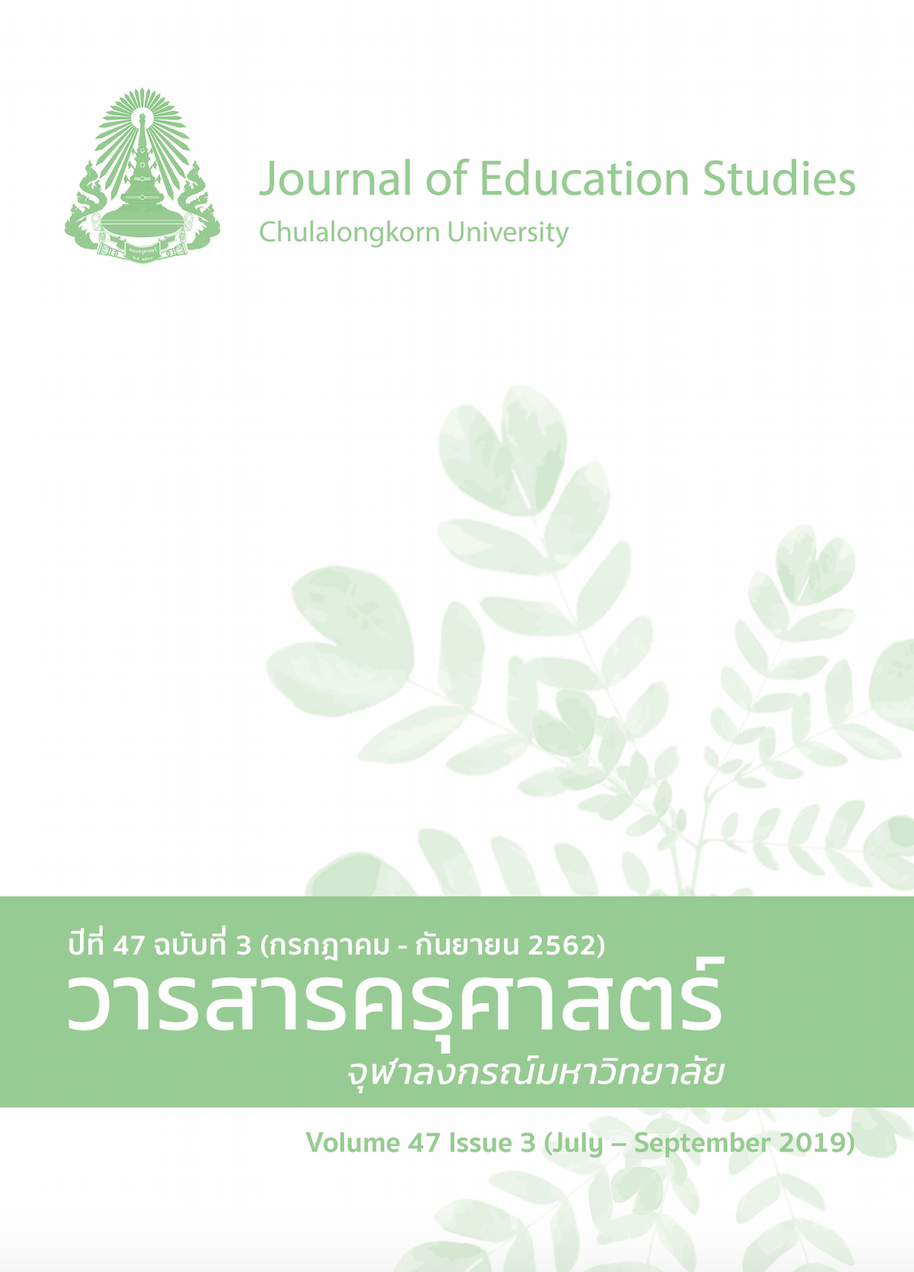An Academic Management Model of the Secondary School under the Office of Basic Education Commission to Promote Analytical Thinking Ability Development of Learners
Keywords:
ACADEMIC MANAGEMENT, AN ANALYTIC THINKING ABILITY DEVELOPMENTAbstract
The purposes of this research were to study the components, identify, and evaluate the academic management model of the secondary school under the Office of Basic Education Commission to promote an analytic thinking ability development of learners. Populations were 2,287 secondary schools under the Office of the Basic Education Commission from 42 areas. Informants were school directors or deputy director in academic affairs from 377 schools. Research tools were questionnaire, in-depth interview, and model evaluation form. Regression analysis was used to analyze the data.
The results showed that: 1) the components of an academic management of the secondary schools under the Office of Basic Education Commission to promote analytic thinking ability development of learners consisted of 6 major components: curriculum and curriculum implementation, education assurance, importance analysis, relational analysis, and principle analysis. 2) There were 3 academic management models to promote an analytic thinking ability development of learners including the curriculum and its application model, the learning and teaching management model, and the education assurance model. These were sets of concepts, objectives, processes, and factors of success under processing framework of planning, operating, and feedbacking in order to achieve an academic management for an analytic thinking ability development of learners. 3) In overview, academic management models was accurate, possible, and useful at the highest level
References
ภาษาไทย
กระทรวงศึกษาธิการ. (2555). แผนพัฒนาการศึกษาของกระทรวงศึกษาธิการ ฉบับที่ 11 (พ.ศ. 2555-2559). สืบค้นจาก www.mua.go.th
จันทรานี สงวนนาม. (2553). ทฤษฎีและแนวปฏิบัติในการบริหาร (พิมพ์ครั้งที่ 2). กรุงเทพมหานคร: บุ๊คพอยท์.
ชินภัทร ภูมิรัตน. (2555). โรงเรียนมาตรฐานสากล ผู้เรียนมีศักยภาพเป็นพลโลก. สืบค้นจากhttps://www.worldclassschoolthai.net
ทิศนา แขมมณี. (2551). ศาสตร์การสอน: องค์ความรู้เพื่อการจัดกระบวนการเรียนรู้ที่มีประสิทธิภาพ (พิมพ์ครั้งที่ 8). กรุงเทพมหานคร: สำนักพิมพ์แห่งจุฬาลงกรณ์มหาวิทยาลัย.
น้ำทิพย์ วิภาวิน. (2552). การรู้เรื่องการอ่าน การรู้สารสนเทศ และการรู้เท่าทันเทคโนโลยีสารสนเทศ Reading literacy, information literacy, and ICT literacy. กรุงเทพมหานคร: มหาวิทยาลัยศรีนครินทรวิโรฒ.
บรรดล สุขปิติ. (2552). ความเข้าใจเบื้องต้นเกี่ยวกับการวิจัย. นครปฐม: หน่วยวิจัยเครือข่ายการพัฒนาครู, มหาวิทยาลัยราชภัฏนครปฐม.
ปรียาพร วงศ์อนุตรโรจน์. (2553). การบริหารงานวิชาการ. กรุงเทพมหานคร: พิมพ์ดี.
พูนภัทรา พูลผล. (2554). การพัฒนารูปแบบการบริหารงานวิชาการในสถานศึกษาขั้นพื้นฐานเพื่อเตรียมผู้เรียนสู่ความเป็นพลเมืองโลก. กรุงเทพมหานคร: โรงเรียนเพลินพัฒนา.
วิจารณ์ พานิช. (2555). วิถีสร้างการเรียนรู้เพื่อศิษย์ ในศตวรรษที่ 21. กรุงเทพมหานคร: ตถาตา.
ศิริชัย กาญจนวาสี. (2556). การวิจัย: วิธีแสวงหาความรู้/ความจริงของมนุษย์. กรุงเทพมหานคร: ภาควิชาวิจัยการศึกษา คณะครุศาสตร์, จุฬาลงกรณ์มหาวิทยาลัย.
สำนักงานเลขาธิการสภาการศึกษา. (2553). สาระสำคัญการปฏิรูปการศึกษาในทศวรรษที่สอง (พ.ศ. 2552–2561). สืบค้นจาก https://nited.kkzone1.go.th/data/download/28-06-2015-15-28-02_31038.doc
สำนักบริหารงานการมัธยมศึกษาตอนปลาย. (2554). มัธยมศึกษายุคใหม่สู่มาตรฐานสากล 2561. กรุงเทพมหานคร: กระทรวงศึกษาธิการ.
สุวัฒน์ วิวัฒนานนท์. (2550). ทักษะการอ่าน คิด วิเคราะห์ และเขียน. นนทบุรี: ซีซีนอล ลิดจ์ลิงคส์.
ภาษาอังกฤษ
Ary, D., Jacob, L. C. & Razavich, A. (1990). Introduction to research in education (4th ed.). New York: Holt, Rinehart and Winston.
Bloom, B. S. (1956). Taxonomy of educational objectives book 1: Cognitive domain. London, UK: Longman.
Cresswell, J. W. (2008). Research design: Qualitative, quantitative, and mixed methods. Thousand Oaks, CA: Sage.
Marzano, R. J. (2001). Designing a new taxonomy of educational objectives. Thousand Oaks, CA: Corwin.




